Cuisines
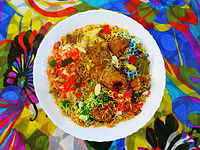

They normally preserves their traditional food, such as Dolma, Biryani and other Assyrian dishes, to greet Finnish people.
| Total population | |
|---|---|
| around 500 [1] | |
| Regions with significant populations | |
| Helsinki, Oulu | |
| Languages | |
| Neo-Aramaic · Finnish | |
| Religion | |
| Predominantly Christianity (majority: Syriac Christianity; minority: Protestantism) |
The Assyrians in Finland (Finnish : Assyrialaiset) comprises migrants of Assyrian ancestry and their descendants born in Finland.
In 2001, there were only 115 Assyrians in Finland. [2] Within six years, the number tripled. [1]
The majority of them living in Oulu, [1] while other smaller communities are seen in the Finnish capital, Helsinki, and as well in Turku and Jyväskylä. [3] They are mostly refugees from Iraq and Iran; [4] this is in contrast to the Assyrian population in neighboring Sweden, where the majority are from Turkey, Iraq, and Syria.
The population is split religiously between Church of the East and Chaldean Catholic members. Chaldean Catholics attend a Catholic church in Oulu where the services are conducted by Italian priests in the Finnish language. [3] Church of the East members attend their services in Lutheran churches. [4]
Assyrians in Finland began arriving noticeably for the first time in 1991. [4]
In April 1994, the community in Oulu founded the social club "Assyrian Society of Finland", recognized by the Finnish government. The club organizes trips, picnics, and Assyrian cultural events, and holds bi-annual elections. Mr Paulus is the current president of the club. [4]


They normally preserves their traditional food, such as Dolma, Biryani and other Assyrian dishes, to greet Finnish people.
Ladies who preserves their Orthodox Christian religion make celebrations for the anniversaries of the Orthodox Bishopics.
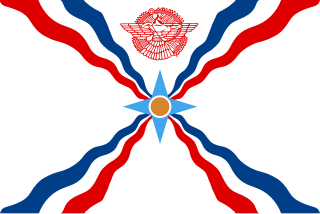
Assyrians are an indigenous ethnic group native to Mesopotamia, a geographical region in West Asia. Modern Assyrians descend from Ancient Mesopotamians such as ancient Assyrians and Babylonians, originating from the ancient indigenous Mesopotamians of Akkad and Sumer, who first developed the civilisation in northern Mesopotamia that would become Assyria in 2600 BCE. Modern Assyrians may culturally self-identify as Syriacs, Chaldeans, or Arameans for religious, geographic, and tribal identification.

The Assyrian diaspora refers to ethnic Assyrians living in communities outside their ancestral homeland. The Eastern Aramaic-speaking Assyrians claim descent from the ancient Assyrians and are one of the few ancient Semitic ethnicities in the Near East who resisted Arabization, Turkification, Persianization and Islamization during and after the Muslim conquest of Iraq, Iran, Syria and Turkey.
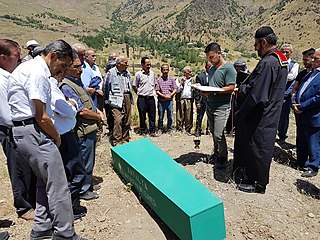
Assyrians in Turkey or Turkish Assyrians are an indigenous Semitic-speaking ethnic group and minority of Turkey who are Eastern Aramaic–speaking Christians, with most being members of the Syriac Orthodox Church, Chaldean Catholic Church, Assyrian Pentecostal Church, Assyrian Evangelical Church, or Ancient Church of the East.

The Assyrian homeland, Assyria, refers to the homeland of the Assyrian people within which Assyrian civilisation developed, located in their indigenous Upper Mesopotamia. The territory that forms the Assyrian homeland is, similarly to the rest of Mesopotamia, currently divided between present-day Iraq, Turkey, Iran and Syria. In Iran, the Urmia Plain forms a thin margin of the ancestral Assyrian homeland in the north-west, and the only section of the Assyrian homeland beyond the Mesopotamian region. The majority of Assyrians in Iran currently reside in the capital city, Tehran.
The Assyrians in the Netherlands are Dutch citizens of Assyrian descent and in the Netherlands mostly known as Arameeërs (Arameans/Syriacs) due to their membership to the Syriac Orthodox Church. They mainly live in the east of the country, in the province of Overijssel, in such cities as Enschede, Hengelo, Rijssen, Almelo and Borne. The main reason that the Assyrians are concentrated there is because it is an industrial area which lies at the Germany–Netherlands border, where a large German Assyrian population resides. Many Assyrians in the Netherlands have relatives in Germany.
Assyrian Americans refers to individuals of ethnic Assyrian ancestry born in or residing within the United States. Assyrians are an indigenous Middle Eastern ethnic group native to Mesopotamia in West Asia who descend from their ancient counterparts, directly originating from the ancient indigenous Mesopotamians of Akkad and Sumer who first developed the independent civilization in northern Mesopotamia that would become Assyria in 2600 BC. Modern Assyrians often culturally self-identify as Syriacs, Chaldeans, or Arameans for religious and tribal identification. The first significant wave of Assyrian immigration to the United States was due to the Sayfo genocide in the Assyrian homeland in 1914–1924.
Iraqi Americans are American citizens of Iraqi descent. As of 2015, the number of Iraqi Americans is around 145,279, according to the United States Census Bureau.

Assyrian Australians, refers to ethnic Assyrians possessing Australian nationality. They are descended from the Northern Mesopotamian region, specifically the Assyrian homeland. Today, their homeland is a part of North Iraq, Southeast Turkey, Northwest Iran and Northeast Syria.

The Christians of Iraq are considered to be one of the oldest continuous Christian communities in the world.

Chaldean Catholics, also known as Chaldeans, Chaldo-Assyrians or Assyro-Chaldeans, are ethnic Assyrian adherents of the Chaldean Catholic Church, which originates from the historic Church of the East.

British Assyrians are British people of Assyrian descent or Assyrians who have British citizenship.

Assyrians in Lebanon or Assyrian Lebanese, are people of Assyrian descent living in Lebanon. It is estimated that there are approximately 30,000 Assyrians currently residing in Lebanon, primarily in Beirut and Zahlé. This number includes the descendants of Assyrian genocide survivors who fled Iraq, Turkey, and Iran between 1915-1934.

Terms for Syriac Christians are endonymic (native) and exonymic (foreign) terms, that are used as designations for Syriac Christians, as adherents of Syriac Christianity. In its widest scope, Syriac Christianity encompass all Christian denominations that follow East Syriac Rite or West Syriac Rite, and thus use Classical Syriac as their main liturgical language. Traditional divisions among Syriac Christians along denominational lines are reflected in the use of various theological and ecclesiological designations, both historical and modern. Specific terms such as: Jacobites, Saint Thomas Syrian Christians, Maronites, Melkites, Nasranis, and Nestorians have been used in reference to distinctive groups and branches of Eastern Christianity, including those of Syriac liturgical and linguistic traditions. Some of those terms are polysemic, and their uses have been a subject of terminological disputes between different communities, and also among scholars.

Assyrian nationalism is a movement of the Assyrian people that advocates for independence or autonomy within the regions they inhabit in northern Iraq, northeastern Syria, northwestern Iran, and southeastern Turkey.
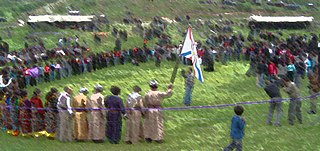
The culture of the Assyrians is both distinct from those of neighbouring ethnic groups as well as ancient. Many Assyrians still speak, read and write various Akkadian-influenced dialects of Eastern Aramaic, labelled by linguists as Northeastern Neo-Aramaic and Central Neo-Aramaic. They are predominantly adherents of several denominations of Syriac Christianity, notably the Ancient Church of the East, the Assyrian Church of the East, the Chaldean Catholic Church, the Syriac Catholic Church and the Syriac Orthodox Church. Some are followers of the Assyrian Pentecostal Church and Assyrian Evangelical Church. A minority are secular or irreligious.

Kha b-Nisan, Ha b-Nisin, or Ha b-Nison, also known as Resha d-Sheta and as Akitu (ܐܟܝܬܘ), or Assyrian New Year, is the spring festival among the indigenous Assyrians of northern Iraq, northeastern Syria, southeastern Turkey and northwestern Iran, celebrated on the first day of April.
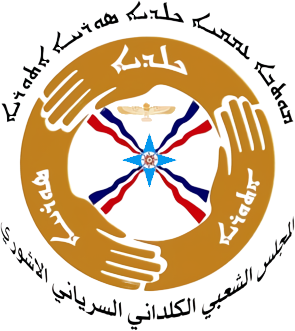
The Chaldean Syriac Assyrian Popular Council, popularly known as Motwa, is a political party in Iraq, that was founded in 2007, on the initiative of Sarkis Aghajan, a high-ranking member of the Kurdistan Democratic Party. As a party that represents minority communities, CSAPC participated in several elections, both on national, regional and local levels, mainly in various coalitions with other minority parties. The current president of the party is Jameel Zaito.

In 2004, Metro Detroit had one of the largest settlements of Middle Eastern people, including Arabs and Chaldo-Assyrians in the United States. As of 2007 about 300,000 people in Southeast Michigan traced their descent from the Middle East. Dearborn's sizeable Arab community consists largely of Lebanese people who immigrated for jobs in the auto industry in the 1920s, and of more recent Yemenis and Iraqis. In 2010 the four Metro Detroit counties had at least 200,000 people of Middle Eastern origin. Bobby Ghosh of TIME said that some estimates gave much larger numbers. From 1990 to 2000 the percentage of people speaking Arabic in the home increased by 106% in Wayne County, 99.5% in Macomb County, and 41% in Oakland County.
Assyrians in New Zealand are New Zealanders of Assyrian descent or Assyrians who have New Zealand citizenship. The Assyrian community in New Zealand began in the 1990s when refugees from Iraq and Iran settled in the country.

Assyrians in Belgium are Belgian citizens of Assyrian descent. Belgium's Assyrian diaspora is concentrated in the Flemish cities of Mechelen and Antwerp, although there are also significant numbers living in Liège and Brussels. The majority of the Assyrian diaspora living in Belgium are of Turkish descent, mostly from the towns of Bohtan (Beth-Qardu), Tur-Abdin and Hakkâri.